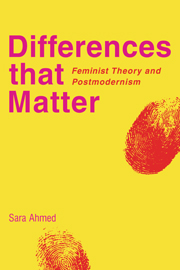6 - (Meta)fictions
Published online by Cambridge University Press: 22 September 2009
Summary
Can we speak of postmodern literature? What does it mean to read literature as postmodern? These questions are more complicated than they might appear on the surface. In much use of postmodernism within literary theory, postmodernism is taken for granted as a generic term for a certain kind of writing. Postmodernism is assumed to have a referent – it is assumed to refer to writings that complicate and destabilise the narratives of classical realism. However, as I have discussed so far in this book, postmodernism is constructed through the very readings which take it for granted as having an object or referent that is already in place. This approach to postmodernism may have important consequences for theories of postmodernism in relationship to literature. It may suggest that what is important is not so much postmodernism as a kind of writing, but postmodernism as a way of reading. Postmodern literary theory does not so much describe a set of fictions, but constructs itself through a critical dialogue with the fictions it names or designates as postmodern.
Why is such a shift from postmodernism as a generic term for writing to postmodernism as a way of reading and constructing ‘the generic’ important? Why might this shift be important to feminism? To account for my desire to enter these debates, I will provide you with an anecdote. My first encounter with postmodernism was through taking a course on American literature at the University of Adelaide in 1989.
- Type
- Chapter
- Information
- Differences that MatterFeminist Theory and Postmodernism, pp. 142 - 165Publisher: Cambridge University PressPrint publication year: 1998



